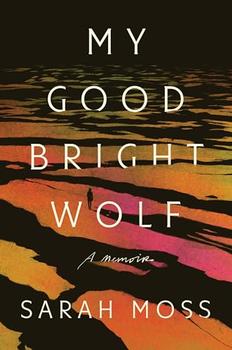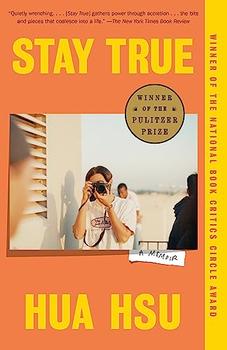Summary | Excerpt | Reviews | Beyond the book | Read-Alikes | Genres & Themes | Author Bio

A Memoir
by Sarah MossSarah Moss has been afflicted with the eating disorder anorexia nervosa since her pre-teen years but was able to keep the condition under some control for decades. During this period she completed a D.Phil (equivalent to an American Ph.D.) in English literature at Oxford University, became a successful professor and lecturer, and wrote several well-regarded novels (including Night Waking and Ghost Wall), among many other personal and professional achievements. As her disorder recurred, however, she found she was unable to write fiction, and so turned to setting down her experiences as a sort of therapy. Her memoir My Good Bright Wolf is the result.
Laid out in three parts, Moss's account plays with various narrative styles. The first and longest section is relayed in the second person as she talks about her childhood and what she believes influenced her eating disorder. At times the passages read like a dark fairy tale (she refers to her parents as the Owl and Jumbly Girl, and her younger brother as Angel Boy). It's here that her wolf is born, a "reverse ghost … a present voice to haunt the past" — a being she imagines she can send back in time to support her childhood self. This section will likely resonate most strongly with readers; like so many who grew up in the latter half of the twentieth century, Moss's identity revolved around her weight. "You had never encountered an adult woman who was not on a diet," she writes, "nor one who was thin enough to be allowed to eat what she wanted." Adding to the pressure was praise at home when she lost weight and condemnation when she didn't. Her father weighed her often ("[A]nd the numbers told him how bad you were, how many times you'd eaten cakes and sweets at a birthday party") and used Moss's weight loss to bully his overweight wife ("[D]o you really want your nine-year-old showing more self-control than you?"). The author only gets healthy after winning a scholarship to Oxford and escaping her home life. The account is horrifying, especially when viewed by today's standards for parenting and current awareness of body-shaming.
The second part reverts to a third-person telling of Moss's first relapse. During the COVID lockdown she once again stopped eating and became so ill her organs were in imminent danger of failing. Refusing both a dextrose tablet and an intravenous drip ("If there's sugar in the drip, she said, I don't want it") she was hospitalized for months in a psychiatric ward. There's more emotional distance in this section, and although her predicament draws in the reader — especially when she isn't permitted to leave the facility — her account doesn't feel as personal.
Finally, part three returns to the second person and contains short chapters that describe the author's various relapses over the years. These paragraphs are more recent, and so she is better able to convey the mental anguish of knowing what she needs to do to get healthy but being unable to do it, at one point contemplating suicide. Once again, the account feels intimate, and her pain is palpable.
Moss does close with a glimmer of hope, as one of her friends tells her, "You have to make safety in the place where you'd like to be." The reader is left feeling that she's moving toward healing but that she may never be completely free from her disorder.
Moss acknowledges that memory is fallible, and that her account differs from what others remember. In fact, throughout the narrative a second, critical voice interjects, constantly disputing her recollections and calling her a liar ("Isn't it convenient that you found a way to earn a living by making things up?" the voice asks her). It's an interesting take on the unreliable narrator; the reader realizes there are two conflicting accounts here, and it's likely neither is completely true.
Books also play an important role in Moss's development; reading is both a refuge for her as well as an unhealthy reinforcement: "Jo March in Little Women … made you feel inadequate because you did like to knit and sew and cook … and you would have liked a frilled sunbonnet." Unfortunately, long passages in which the author discusses the plots of several classics, pointing out the various ways female characters are portrayed and how these images could be harmful to some, cause the pace to sag a bit, even though she does eventually bring the narrative back to her own experiences.
I confess that memoirs are a difficult genre for me; one needs to be remarkable in either its content or its writing style for me to fully appreciate it. My Good Bright Wolf succeeds on both counts. Moss's prose is gorgeous, bordering on poetic, and her account is both troubling and harrowing. I highly recommend it for most readers, including young adults who may be struggling with their own body image issues.
![]() This review
first ran in the November 6, 2024
issue of BookBrowse Recommends.
This review
first ran in the November 6, 2024
issue of BookBrowse Recommends.

If you liked My Good Bright Wolf, try these:

by Veena Dinavahi
Published 2025
In this darkly humorous and wrenchingly sincere memoir, a young Indian American woman's dreams of being a well-adjusted college student get wildly derailed when her struggles with mental health land her in the office of a charismatic alternative therapist and his self-help cult.

by Hua Hsu
Published 2023
From the New Yorker staff writer Hua Hsu, a gripping memoir on friendship, grief, the search for self, and the solace that can be found through art.
Your guide toexceptional books
BookBrowse seeks out and recommends the best in contemporary fiction and nonfiction—books that not only engage and entertain but also deepen our understanding of ourselves and the world around us.